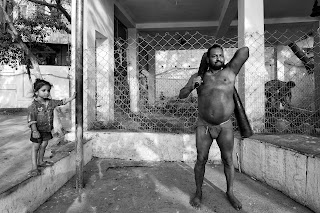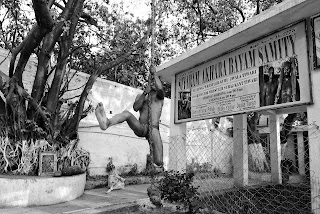26 July 2020, Kolkata, India ; Kushti is an indigenous form of Indian wrestling tracing back three thousand years to the time of “malla-yuddha,” with Mughal refinements added in the 16th century. Kolkata is not a center for kushti like some north Indian towns such as Varanasi, Mathura and Allahabad. Yet, an early morning visit to the akharas behind Mullick Ghat on the banks of the Hooghly can be a novel and refreshing experience for a photographer in the “City of Joy.”
- by Ayan Biswas
Kushti is India's traditional wrestling, and is an ancient form of wrestling. It was held in great importance in Indian societies, but its popularity has dwindled over the years, although there are concerted efforts to revive it. Kushti practitioners face grueling daily training, a strict diet and celibacy.
In Kolkata there only few akhara still alive but the condition of those are not that much good enough. Jawla Tiwatri palowan akhara is one of them. Jawla Tiwari palowan still fighting to save his akhara and dream to make his son as a great pehlwan in India. Meanwhile, after completing his mace exercises,Jawla Tiwari positions it carefully on his way to the akhara, casting his eye on the rest and voicing out instructions about correct posture and exercise technique. “Kushti is all about agility (“lachak”), strength alone is not enough,”. he soil is sourced from the banks of the Ganges and then very carefully treated to sift out stones and pebbles. Ayurvedic oils, turmeric, Multani Mitti , salt and neem are then added. This is done every 2 to 3 months (about 5 times a year). Water is an important ingredient as well to ensure that the soil is soft enough on the bodies but not too soft to limit feet movement.
This is the best part of a Pehlwan’s life. After the morning’s kushti and workouts are done. This both nourishes and heals the body. It is also a time of friendly banter, catching up and shifting gears to the rest of the day. The akhara clay is considered to be pure with therapeutic properties. Pehlwans worship the pit and continuously douse themselves with clay.
- by Ayan Biswas








No comments:
Post a Comment